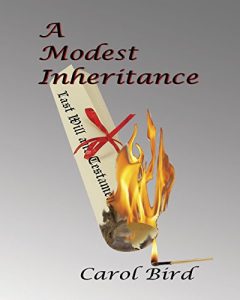A Modest Inheritance by Carol Bird, Author Interview
 A MODEST INHERITANCE, BY CAROL BIRD, takes us to West Virginia in a tightly drawn, subtle mystery in which much is behind the scenes and the apparent monetary stakes aren’t as high as the spiritual and emotional ones. I enjoyed dropping into the life of every-woman protagonist Amanda as she drove home to Charleston and learned that her 100-year old grandmother had inexplicably changed her will one year before her death. As Amanda travels back and forth between her own home in Annapolis and her late grandmother’s hillside, historic Charleston house—under the new will about to become the house of someone outside of Amanda’s family—Amanda gradually realizes that the end of her grandmother’s life was not idyllic in every way, as many people would have her believe.
A MODEST INHERITANCE, BY CAROL BIRD, takes us to West Virginia in a tightly drawn, subtle mystery in which much is behind the scenes and the apparent monetary stakes aren’t as high as the spiritual and emotional ones. I enjoyed dropping into the life of every-woman protagonist Amanda as she drove home to Charleston and learned that her 100-year old grandmother had inexplicably changed her will one year before her death. As Amanda travels back and forth between her own home in Annapolis and her late grandmother’s hillside, historic Charleston house—under the new will about to become the house of someone outside of Amanda’s family—Amanda gradually realizes that the end of her grandmother’s life was not idyllic in every way, as many people would have her believe.
I was able to meet author Carol Bird and ask a few questions about A Modest Inheritance.
Q: A quality of reserve heightens the tension in your book. The reader feels himself in protagonist Amanda’s shoes as she tries to feel and express gratitude to people who took care of her late grandmother, but also begins to doubt whether they’re deserving of gratitude. I think this is a great conflict, one that occurs sometime in many peoples’ lives, yet I’m stumped when I try to think of other novels that highlight it. Do you know of any?
A: No, although they might be out there. I wrote this because I began to realize that Amanda’s experience is one many of us go through largely alone, and few discuss in depth. It’s a sometimes a shocking revision to the ideas we have had about friends and family. It made me realize I had been naïve and that perhaps this story could help someone else navigate similar terrain, or at least be entertained.
Q: Amanda meets a neighbor of her late grandmother, a man who’s sweet, helpful, handsome, and semi-available. She comments, mentally, that she needs to remind herself that not all men are bad. In a future novel are you planning to tell Amanda’s past story? Without spoiling fiction yet to come, can you give us a few-sentence sketch of what you know about Amanda that caused her to have this thought?
A: It’s all in the present for Amanda. The men in the story itself are villains, to some degree. Her father and Hank acted unilaterally to seal Evelyn’s fate despite her wishes, Ernie is Hank’s tool with a cash-register honesty that misses the greater moral point. Hank is driven by resentment and entitlement and Gary LeVile is purely venial. Except for Derek and Alan, Amanda’s brother, the males are uniformly bad.
Q: Today’s fiction market is predominately women, my theory being that men spend on sports the time women spend reading. Men, as characters, are often villainous, meeting defeat at the hands of wonder women protagonists. Yet you chose to write a realistic woman, determined but self-questioning and possessing no extraordinary strength, which I think makes your book the more interesting. But do you feel pressure to write wonder women? If so, is it internal, perhaps caused by frustration at the glacial pace of the women’s movement, or is it external, in response to a market that perhaps wants its wounds salved in its fiction?
A: I think those are some very accurate perceptions. I suspect the answer is that broad-brush characters are easy to write and read. It’s a bow to the need to sell through making fiction escapist and accessible. I wanted to present heroism on a deeper level. I wanted to show that an average everywoman has inside her the ability to withstand and conquer much more that she might think if she remains true to herself and her own guiding lights. As a matter of fact, each chapter of the novella is a step in the classic hero’s journey – it’s a one-to-one match. I tried to make the chapter titles an evocative clue about that but apparently, its too subtle. I think however, that is why the book satisfies though on the surface it seems so quiet. It really is the classic hero’s journey.
Q: You mentioned that you have five books planned. Can you tell us a little about each? Working title? Setting? Male or female protagonist? Conflict or conflicts you plan to highlight?
A: Well Amanda will reappear in the sequel to A Modest in a novella titled Grind Exceedingly Fine. We will see Special Agent Angela Saunders on the hunt to give Gary LeVile what he deserves. At over 200 pounds and after lifetime of government work, Angela is also an everyday hero I think many can relate to.
The action will be moved to the Washington-Baltimore region with a rather stunning conclusion at Sparrows Point. I think it’s fun to actually be living inside the setting of a book.
I am currently about half-way through a work of magical realism dedicated to all those who long for a home worth having. It is also set within the Appalachians, the oldest mountains in the world. In it, high above the quaint but dying town of Halewater, a miracle is struggling to be born at a place called Smith Mountain Farm. Called forth by environmental destruction and sickness, the spirit of life has incarnated in a little girl named Myst McAdams. She has come to evolve a new humanity with the capacity to heal the dying town. With Myst also reenters the destructive shadow, now named Derek Pitt, who follows her through time. They will meet on the mountain to determine whether life or the continued destruction of Halewater will prevail. To protect the fragile miracle and catalyze an ascension of consciousness, Myst must assemble a pantheon of archetypal energies.
I hope to have it done by Christmas and available sometime next year depending on the million uncontrollable factors that go with all that.
Q: Off the top of your head, what are five among your all-time favorite novels? What makes these books among your favorite?
A: First love was the original Doctor Doolittle series because it was very like my own childhood in feeling. I still love the southern woman writers with an emphasis on Flannery O’Conner for the ability to use language any way they want, all the time. Like many, I suspect Jane Austen might be top of the list. You cannot read her without envy and admiration and elevation of your own expressive abilities. The rest are poets – John Milton; Emily Dickinson. They show intensity without quantity, precision, heart, and the value of hidden structure. Most importantly, to write by ear as sound is under-rated by most. I will read anything however. I’ve read pretty good bathroom walls a few times.
Gary Garth McCann
First-prize winner for short works and for suspense/mystery, Maryland Writers’ Association, Gary Garth McCann is the author of the novella Young and in Love? and of the novels The Shape of the Earth and The Man Who Asked To Be Killed, praised at the Washington Independent Review of Books. His most recent published stories are available online in Chelsea Station Magazine, Erotic Review Magazine, and in Mobius: The Journal of Social Change. His other stories appear in The Q Review, reprinted in Off the Rocks, in Best Gay Love Stories 2005, and in the Harrington Gay Men’s Fiction Quarterly. See his blogs at garygarthmccann.com and streamlinermemories.com.
- Web |
- More Posts(57)
